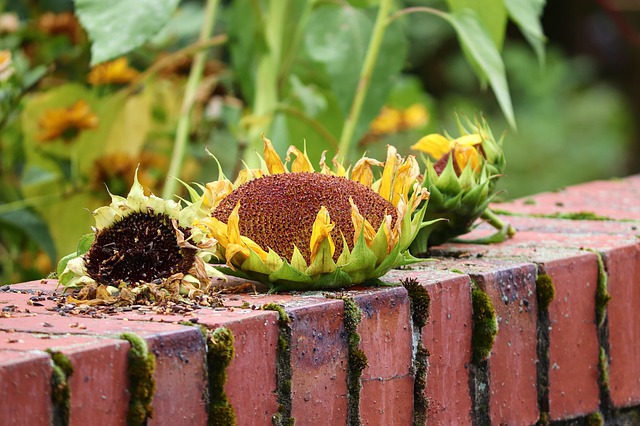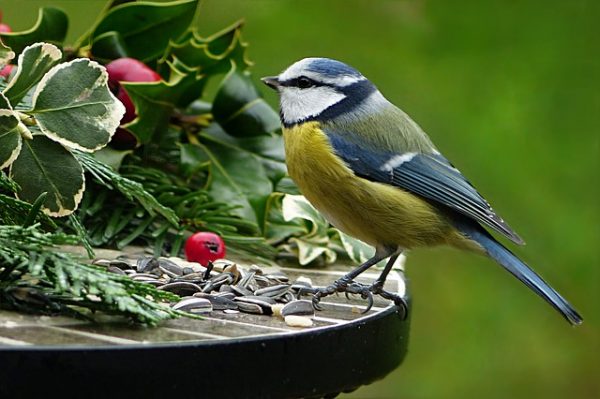What birds eat over the winter very much depends on the food that is available in the wild and also the food that us bird lovers put out for them as a tasty feast. Over the winter months, many of the insects and fruits that are available through nature are not available. However, birds still require energy to be able to stay warm and survive in the most difficult time of the year.
How Birds Feed in the Winter
Over the winter birds will often move around to find the best food around. Although, with winter, also comes harsh conditions and the availability of food can be scarce. Whilst many birds survive a normal winter, during periods of severe cold weather, it can lead to multiple deaths. This is primarily due to food not being accessible or birds not being able to access the food that they have stored during the Autumn or early winter.
Natural Foods Available to Birds in the winter:
There are a number of natural foods that birds can eat over the winter and many of them will be in our own back gardens. They help provide a healthy and balanced diet but some of them will not be available to the extent that they are in other seasons.
Over the winter, there are many natural foods around that birds will eat.
Seeds: Seeds are an important part of wild birds diet, especially during the winter. Whilst many of us will be tempted to remove spent flowers from plants, birds can actually make use of them. Some common flowers in our gardens that birds will enjoy are marigolds, sunflower and cosmos.
Fruit: Whilst there is not much fruit around over the winter, there may be some spent fruit from the harvest season. Leaving this will provide birds with the option of incorporating this into their diet.
Grain: For those living near agricultural fields, there will be plenty of grain left over from the harvest. Birds will relish in this and it will provide a great deal a food for those early winter days.
Insects: Birds thrive on insects during the summer season and they provide a great deal of protein for their diets. There may not be as many around over the winter period but some birds will forage for dormant insects and larvae.
Nuts: Wild nuts are extremely popular with many woodland birds. Ensuring that these are left for them will provide them with a good natural source of food.
Feeding birds in the winter
Birdfeeders are extremely important to wild birds in the winter time. Whilst there are natural foods around, a harsh winter can cause a reduction in wild foods and this can have a material impact on the mortality rate of our birds.
Whilst birds may not feed from a feeder to begin with, over time they will start to visit. This is primarily due to the birds already having their source of food and will generally look for new ones when their current supply runs out. Whilst waiting for birds to visit the garden, be sure to keep the feeding station clean with a good supply of fresh food.
Once birds have found your food source, they will continue to revisit all the time that there is food available. Birds have incredible memories and they may also remember if you fed them earlier in the year or previous winters.
During the winter time you may also find some other interesting species of birds visiting your garden. This is mainly due to the fact that birds will visit that normally find their food naturally or are lower in numbers.
How you can help birds over the winter
Feeding stations
Set up feeding stations in the garden so that birds have plenty of food to eat over the winter months. A variety of feeding stations will ensure that you are able to offer a variety of feed to suit either the season or the birds that visit your garden.
Keep your feeding stations clean
Keeping your feeding station clean in the garden is incredibly important. Bacteria and fungal spores can develop which will cause infections in your garden visitors.
Offer a varied diet for the birds visiting your garden
Offer the birds in the garden a varied diet. This will ensure not only do you attract more species of bird, but also ensure that they get a mixture of nutrients over the winter period. Check out our article on different types of birdseed for the garden for further information.
Ensure that you have a fresh supply of water
Ensure your garden has a fresh supply of drinking water. Standing water can often become stagnant and spread disease. When the weather is harsh and we experience a frozen spell, the birds will have little chance of finding fresh water until it has thawed later in the day. Ensuring that there is fresh water available in the morning will make a bit difference to your visitors.





























